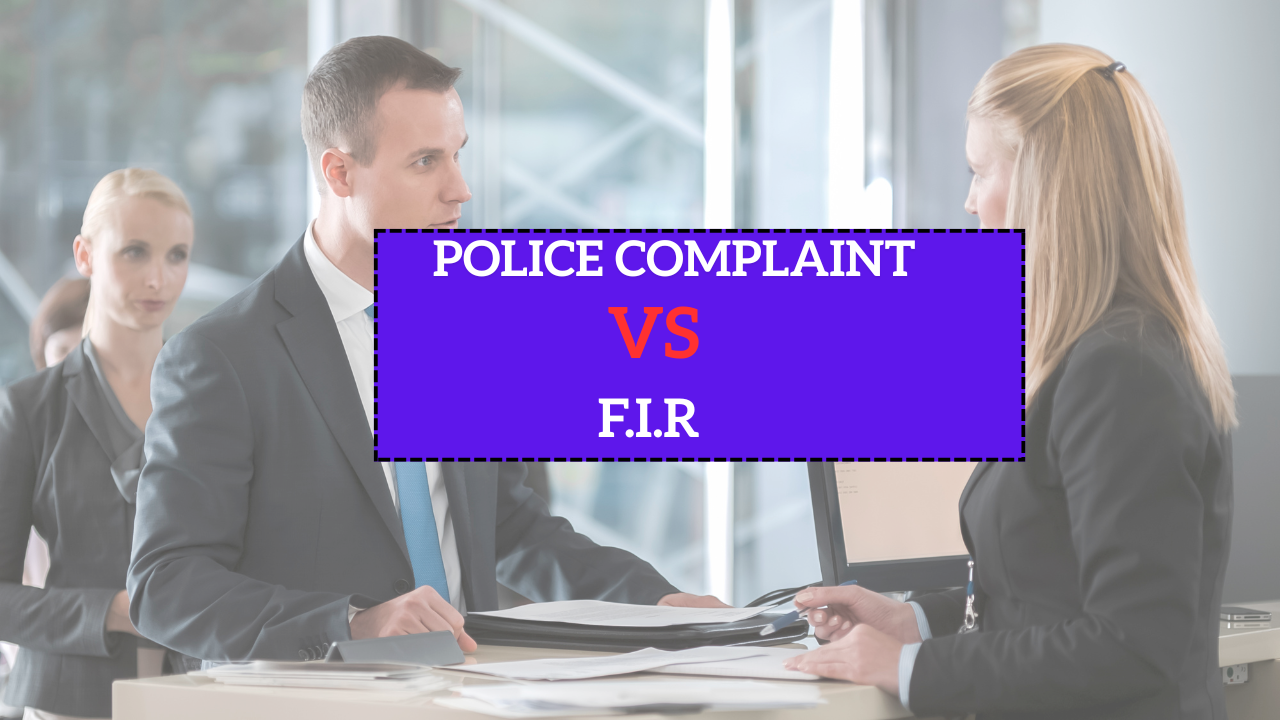When you face a crime or a legal dispute, the first step is often to approach the police. But many people are confused about whether to file a police complaint or an FIR (First Information Report) — and whether there’s a real difference between the two.
In this post, we’ll explain what a police complaint and an FIR are, how they differ, and in which situations you should file each.
What Is a Police Complaint?
A police complaint is a general written or oral communication made to the police about a crime, dispute, or any issue that requires their attention.
You can file a police complaint for:
- Theft or lost items
- Neighborhood disturbances
- Harassment
- Fraud
- Threats
- Property disputes
- General grievances
It is not mandatory for the police to register an FIR based on a complaint — they may conduct a preliminary inquiry first.
What Is an FIR?
FIR stands for First Information Report. It is the official record of information about a cognizable offence, registered by the police under Section 154 of the Criminal Procedure Code (CrPC).
A cognizable offence is a serious crime where the police can arrest without a warrant, such as:
- Murder
- Rape
- Kidnapping
- Dowry death
- Robbery
- Assault with deadly weapons
Once an FIR is filed, the police are legally bound to investigate the matter and submit a report to the Magistrate.
Key Differences Between Police Complaint and FIR
| Aspect | Police Complaint | FIR (First Information Report) |
|---|---|---|
| Definition | Informal request or report to police | Formal registration of a serious (cognizable) offence |
| Legal Status | Not always leads to investigation | Must lead to investigation once registered |
| Applicable Cases | Any type of complaint or grievance | Only for cognizable offences |
| Section Under Law | Not specifically defined | Section 154 of CrPC |
| Purpose | To inform or request action | To initiate a criminal investigation |
| Filing Mode | Written, verbal, or online | Written or oral at police station; recorded by police |
| Proof Needed | Basic facts or suspicion | Specific facts suggesting a cognizable crime |
| Copy to Complainant | Not always mandatory | Free copy must be given to complainant under CrPC |
When Should You File a Police Complaint?
You should file a police complaint if:
- You’ve lost a wallet, phone, or document
- There’s a civil issue or non-cognizable offence (like public nuisance, minor fights)
- You’re facing harassment or threats but no serious crime yet occurred
- You need a record of reporting the incident (for insurance, etc.)
Police may:
- Conduct an inquiry
- Warn the offender
- Convert the complaint into an FIR (if the matter is serious)
When Should You File an FIR?
File an FIR when:
- A serious crime has occurred (e.g., murder, rape, theft, or kidnapping)
- You or someone else is in immediate danger
- The offence is clearly cognizable and punishable by imprisonment of 3+ years
- Police action is urgently needed
If the police refuse to register an FIR, you can:
- Write to the Superintendent of Police
- Approach the Magistrate under Section 156(3) CrPC to order the police to register an FIR
Can a Complaint Turn Into an FIR?
Yes. If the police find that a complaint discloses a cognizable offence, they are required to register an FIR and begin an investigation.
You may even begin with a complaint and later press for FIR registration if the situation worsens or evidence becomes clearer.
Can I File Both?
Not at the same time for the same incident.
- File a complaint if you’re unsure whether it’s a cognizable offence
- File an FIR directly if it’s a clear and serious crime
Final Thoughts
Understanding the difference between a police complaint and an FIR can help you take the right legal action in stressful situations.
- A complaint is informal and may or may not lead to a case.
- An FIR is formal, and its filing starts a criminal investigation.
If you feel that the police are ignoring your complaint or refusing to register an FIR without proper reason, you have legal rights and can escalate the matter.
Always keep a copy of the written complaint or FIR and follow up regularly for updates.

